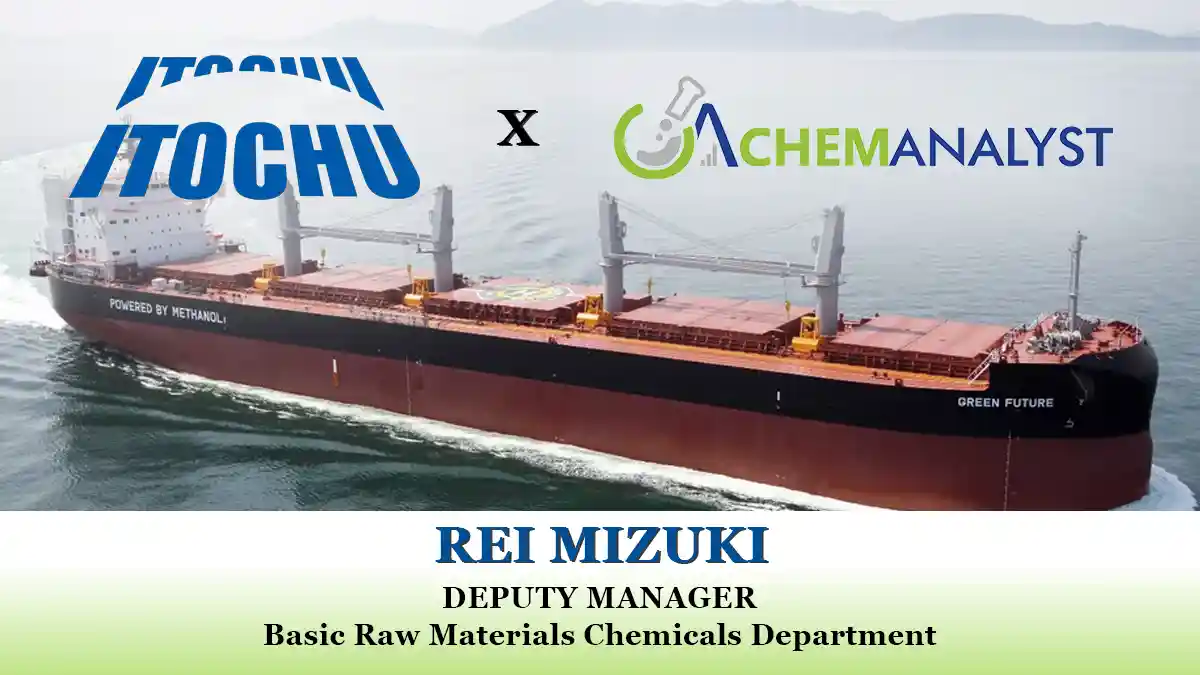Welcome To ChemAnalyst

ITOCHU Corporation, a global leader in trading and energy solutions, is taking strategic steps to accelerate the adoption of low-carbon methanol in the shipping industry.
The maritime sector is undergoing a transformative shift as global decarbonization targets push the industry toward cleaner, more sustainable fuel options. Among the emerging solutions, methanol stands out as a practical and scalable low-carbon alternative.
In this interview, ITOCHU discusses its vision, strategy, and technical approach to developing methanol as a key marine fuel, as well as how these efforts align with Japan’s carbon neutrality goals and IMO’s net-zero 2050 targets.
Q1: How is methanol as a fuel different from other green fuels like ammonia or hydrogen?
A: Methanol's key advantage is being a liquid at ambient temperature and pressure, allowing the use of existing infrastructure for easier handling and bunkering. It is also a clean-burning fuel that significantly reduces SOx, NOx, and PM emissions. While ammonia and hydrogen have no CO2 emissions at combustion, they present their own challenges, such as the toxicity of ammonia and the cryogenic management and risk of metal embrittlement associated with hydrogen. Thus, we believe methanol can be a balanced and practical solution for near-term adoption.
Q2: How does ITOCHU plan to expand its role in the global marine fuel supply chain?
A: We will leverage our global network to build an integrated supply chain for alternative fuels like methanol and ammonia etc. Our plan is to establish bunkering hubs in major ports worldwide, expanding from production and procurement to final supply.
Q3: Can you quantify the GHG reduction achieved by using your biomass-derived methanol compared to conventional marine fuels?
A: Our biomass-derived methanol offers significant GHG reductions (more than 65%) on a Well-to-Wake (life-cycle) basis compared to conventional fuels. While the exact percentage varies by production pathway, it represents a substantial step towards decarbonization as we work towards certified figures.
Q4: How does this initiative contribute to Japan’s carbon neutrality targets by 2050 and the IMO’s decarbonization strategy?
A: This initiative is a tangible step towards achieving Japan's 2050 carbon neutrality goal and the IMO's net-zero 2050 strategy. By promoting the adoption of low-carbon fuels, we directly contribute to the decarbonization of the global shipping industry.
Q5: What technical challenges are involved in ship-to-ship bunkering for methanol compared to conventional fuels?
A: The main technical challenges for methanol bunkering involve managing its low flash point and toxicity. This requires strict safety protocols, including specialized equipment, leak detection systems, and thorough crew training to ensure safe operations.
Q6: What infrastructure change or retrofitting is required for dual-fuel carriers to use methanol efficiently?
A: Retrofitting ships for methanol use requires installing dedicated, corrosion-resistant fuel tanks and a new fuel supply system. Engine modifications are also necessary to create a dual-fuel capability, ensuring safe and efficient operation.
Q7: How scalable is the production and distribution of biomass-derived methanol to meet growing global shipping demand?
A: While not yet at full scale, bio-methanol production has significant growth potential by utilizing diverse feedstocks like agricultural waste, municipal solid waste, and sustainable forestry products. We are expanding our feedstock sourcing globally and also developing e-methanol to meet future demand.
Q8: How do you see low-carbon methanol adoption impacting the competitiveness of Japanese shipping companies internationally?
A: Adopting low-carbon methanol enhances the international competitiveness of Japanese shipping companies by meeting stricter environmental regulations. It attracts eco-conscious cargo owners and strengthens their brand as sustainable leaders in the global market.
Q9: Are there plans to supply low-carbon methanol to other shipping companies or markets beyond NYK Line?
A: Yes, this is just the beginning. We are actively planning to expand our low-carbon methanol supply to other shipping companies and major ports globally. We are already in discussions with multiple potential partners to build a wider network.
Q10: How is ITOCHU working with regulatory bodies, such as the IMO or local governments, to accelerate the adoption of low-carbon fuels?
A: We actively collaborate with regulatory bodies like the IMO and local governments through industry associations. Our goal is to help develop international safety standards and port infrastructure to accelerate the adoption of low-carbon fuels.
Q11: Do you anticipate competition from other low-carbon marine fuels, and how is ITOCHU positioning itself amidst these alternatives?
A: We anticipate competition and are pursuing a multi-fuel strategy to meet diverse customer needs. We see methanol as a strong near-term solution due to its practicality, while also developing supply chains for future fuels like ammonia and hydrogen.
Q12: Beyond marine transportation, does ITOCHU plan to explore low-carbon methanol for other industrial or energy applications?
A: Yes, we plan to promote green methanol in other sectors, replacing fossil-based methanol in the chemical industry for products like plastics and paints. We are also exploring its potential as feedstock for fuels like SAF or low carbon gasoline.
Q13: How does this initiative fit into ITOCHU’s long-term business vision and the “Brand-new Deal” management policy?
A: This initiative directly aligns with our "Brand-new Deal" management policy by contributing to SDGs and creating new value "downstream." It addresses our customers' decarbonization needs, transforming our business and driving sustainable growth.
We use cookies to deliver the best possible experience on our website. To learn more, visit our Privacy Policy. By continuing to use this site or by closing this box, you consent to our use of cookies. More info.
